Contemporary Discriminatory Linguistic Expressions Against the Female Gender in the Igbo Language
Ogbonna Anyanwu
University of Uyo, Nigeria
Ngozi Ugo-Ochulo
Michael Okpara University of Agriculture, Umudike, Nigeria
Contemporary Discriminatory Linguistic Expressions Against the Female Gender in the Igbo Language
Ogbonna Anyanwu
University of Uyo, Nigeria
Ngozi Ugo-Ochulo
Michael Okpara University of Agriculture, Umudike, Nigeria
The Igbo traditional society is patriarchal in nature with a prevalence of gender stereotypes.Men train their male children to grow up bold, strong, courageous, audacious and fearless while women on the other hand groom their female children to be soft-spoken, subservient and gentle. Both men and women have accepted their gender roles as a characterization which fate and destiny have bestowed on them, and are sensitized and indoctrinated in such a way that there are no conflicts between the two groups on the basis of their inherent traditional roles(cf. Ozumba, 2005). In the context of the Igbo traditional setting and within the confines of the gender stereotypes women are generally not viewed or perceived by their male counterparts as having the same status. This perception of women is often reflected in the social use of language to the extent that women are sometimes socially addressed and described with biased and discriminatory linguistic remarks and expressions. This paper descriptively examines, from semantic and pragmatic viewpoints, some discriminatory and biased Igbo linguistic expressions used by some men against women in contemporary Igbo society. The data for the study were collected mainly through oral interviews. The findings reveal that women are addressed and described with derogatory linguistic terms and imagery, portrayed as inferior to men. Based on the findings, the paper recommends a re-orientation of Igbo men from a young age, starting with parental discouragement of this trend in the home. Further studies on the general attitude towards women in contemporary Igbo society as linguistically expressed are suggested since such studies will constitute veritable sources of research information.
language, women, gender, discriminatory, Igbo
1. Introduction
The values and belief systems of any society are embedded and reflected in that society’s linguistic system. Thus, all kinds of social phenomena (societal views and attitudes) can be expressed using language. Language, therefore, is used to reflect different attitudes including gender biased attitudes and perceptions (cf. Wang, 2012,p. 150). Gender is the sex-role identity used by humans to emphasize the distinctions between males and females (Adegbite, 2009, p. 12). It refers to categories distinguished by biological characteristics which also distinguish people on the basis of their socio-cultural behaviour, including speech (Holmes, 2013, p. 159). Gender is what biologically and culturally distinguishes a man from a woman. From childhood, boys and girls are traditionally taught to conform to the gender roles assigned to them by their society or culture. These roles are then internalized by both the boys and the girls in that society, and they characteristically manifest them. As noted by Emenyi (2005,p. 38), “the male and female children (in most cultures) are socialized differently, the former is groomed to be a ‘conqueror’ while the latter is trained to serve the needs of the conqueror”. She further notes that, “the prominence given to male traits as attributes that are positively valued has resulted in the institutionalization of male dominance”. Gender bias occurs when there is an unfair, discriminatory inclination to recognize,treat or respond to issues on gender lines. Some gender biases are deeply rooted in some cultures and religions, and they can be against either the men or women. In some cultures, for instance, women are exposed to forms of marginalization such as female genital circumcision or being prohibited from having property rights, as is the case in most parts of the Igbo society in Nigeria.
The Igbo society, like most other indigenous communities in Nigeria, is patriarchal.Igbo women are often perceived as inferior to Igbo men. Some aspects of human identification and socialization in this society exalt the man and not the woman. This socio-cultural situation is also reflected in the language use. For example, women are often either silent or silenced in multi-participant discourses involving men, some of whom have cultivated the habit of linguistic discrimination and bias in the way they describe and address women. Even though the Igbo language does not have gender distinction in its pronominal system, linguistic expressions of bias against women are evidently manifested in the way the men describe women. This points to the fact that the perception of the female gender as not having the same status as its male counterpart is not an inherent part of the linguistic system of Igbo: it is an attitudinal phenomenon. This is unlike the case in English as noted by Homes (2013), where many words reinforce a view of women as a subordinate group and certain word structures generally take the male form as the base form and add a suffix to signal the female counterpart (for example,lion/lioness,actor/actress,hero/heroine). The male form is implicitly the norm while the use of additional suffixes to signal ‘femaleness’ is seen as conveying the message that women are ‘derivatives’.
Mbarachi (2010) has studied the sexist use of language in English and Igbo, and has concluded that sexist language against both men and women exists, and that language can be used to discriminate and relegate to the background of a particular sex in a given community, thus reflecting the thought pattern of some members of the speech community. The present paper, however, focuses on the semantic and pragmatic analysis of discriminatory linguistic expressions against women in contemporary Igbo society. It highlights the meanings and pragmatic import inherent in the use of discriminatory expressions describing women in contemporary Igbo society as inferior, helpless, voiceless, and as property that can be owned by men. There are no studies prior to this one that focus on this area. The present study, therefore, is both timely and fills a gap in the research.
It is important to acknowledge, before beginning, that there are some unbiased and positive Igbo expressions with which women are described. Those include:nwanyi eji aga mba(a woman with whom one can travel to anywhere/a woman of substance),mkpara eji aga ije(figuratively, a walking stick for the husband, meaning a helper, a supporter),ezi nwanyi bu ihe nye di ya(a good woman is light to the husband), etc. These positive expressions are not within the focus of the present study. Igbo refers to both the language and the speakers of Igbo speech communities of the south-eastern Nigerian states of Abia,Anambra, Ebonyi, Enugu and Imo. It is spoken as a minority language by some groups in the neighbouring south-south Nigerian states of Akwa Ibom, Delta and Rivers. Igbo has scores of regional dialects which are mutually intelligible.
The remaining part of the paper is organized as follows: In section 2 we present the methodology; section 3 is the data presentation with its analysis; section 4 is the discussion of findings; section 5 is the conclusion.
2. Methodology
This study was carried out between January, 2016 and March, 2017, using a descriptive survey involving the use of questionnaires and oral interviews. The study area for this research consisted of these cities: Abakiliki, Awka, Enugu, Owerri and Umuahia, which are the capital cities of the five south-eastern states of Nigeria: Ebonyi, Anambra, Enugu,Imo, and Abia, where the Igbo language is largely and indigenously spoken by a larger number of the residents. The inhabitants of the study area were mostly civil servants,business men and business women, students, and people from all walks of life. Four hundred (400) respondents (men) participated in the the study. They comprised men from the ages of twenty-one to sixty-five years who reside in the study area. All the respondents speak Igbo as their first language and English as their second language. Data were collected mainly through oral interviews. The respondents were asked to recollect,mention, and explain words, names, proverbs and other expressions they had used or still use to address or describe women’s attributes negatively. The respondents’ responses were gathered and analyzed within the framework of speech codes theory (SCT).
SCT (Philipsen, 1987, 1992, 1997, 2003; Philipsen et al., 2005) is a framework for understanding the intricacies of communication within a speech community, highlighting the ways in which social variables such as culture, gender, occupation, societal norms,and values interact with communication codes within a given community. As noted by Griffin (2015), SCT provides answers about the existence of speech codes, their substance, the way they can be discovered, and their effect on people in the culture of a given speech community. SCT has six propositions which may guide its application in specific contexts. They are outlined below in (i-vi).
(i) There is a distinctive speech code in every distinctive culture (community)
(ii) There exist multiple speech codes in any given speech community
(iii) Any particular speech code involves culturally distinctive psychology, sociology or rhetorics
(iv) The significance of speaking depends on the speech codes used by speakers and listeners for creating and interpreting their communication within their speech community
(v) The inherent terms, rules, premises and contexts of a speech code are inextricably integrated into actual speech
(vi) The artful use of a shared code is a sufficient condition for predicting, explaining, and controlling the form of discourse about the intelligibility, prudence, and morality of communication conduct
In the discussion of data in section 4, we shall see that some of the propositions of SCT are heavily ingrained in the discriminatory linguistic expressions used by men to describe women in contemporary Igbo society.
3. Data Presentation and Analysis
The discriminatory expressions used against women in the Igbo society can be traced to pervasive male-oriented negative rhetorics in social discourses. Such negative rhetorics have over time metamorphosed into overt linguistic prejudice and hostility toward women, who are typically and linguistically portrayed as being senseless, morally debased, devilish, childish, and weak (cf. Oha, 1998). In this section, the data collected have been presented under different semantic themes within which they are semantically and pragmatically analyzed. For this study, each Igbo biased linguistic expression collected from the respondents is translated into English. The pragmatic context of description under which the linguistic expression is applicable is stated.
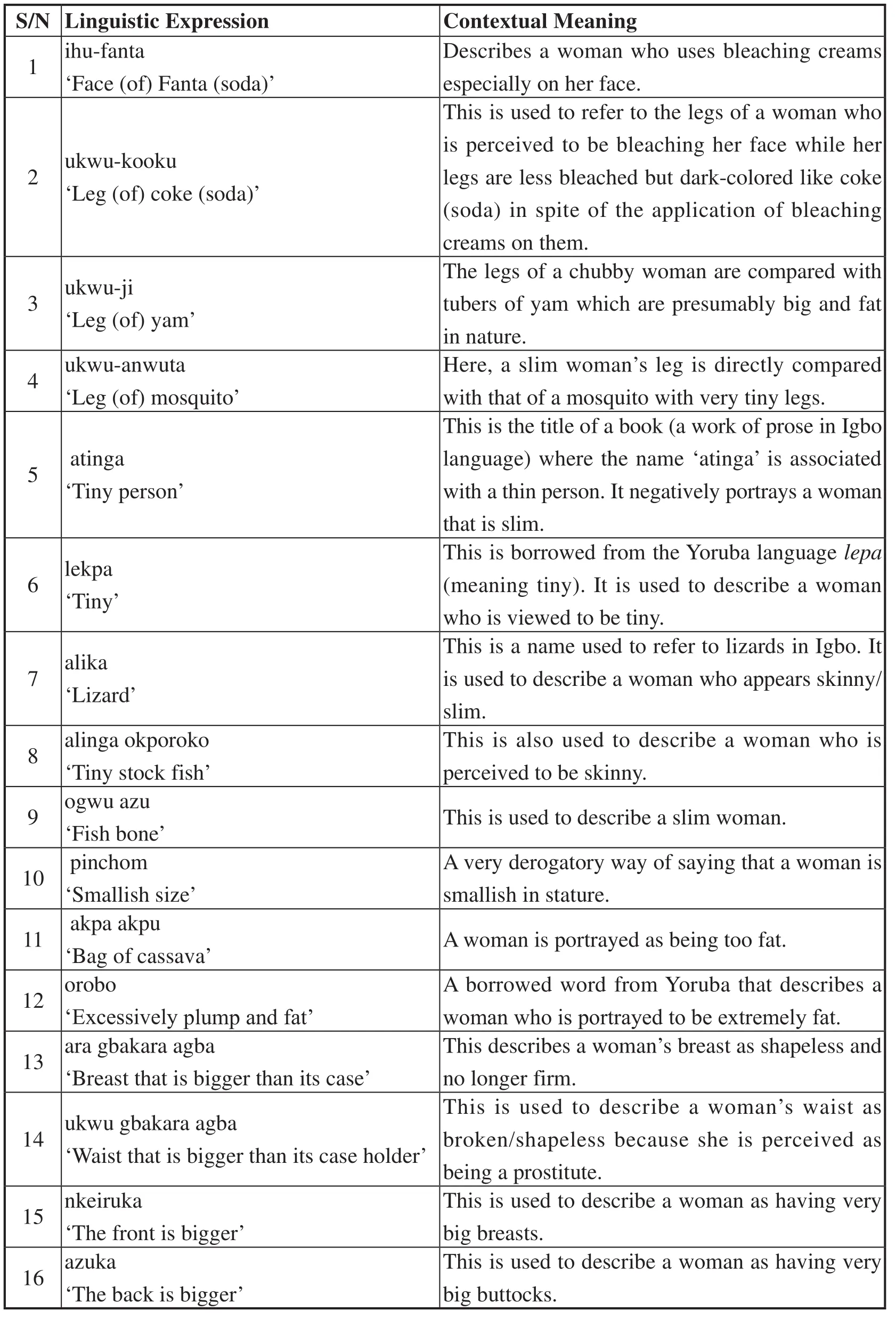
Table 1. Discriminatory expressions that describe women and their physical appearance
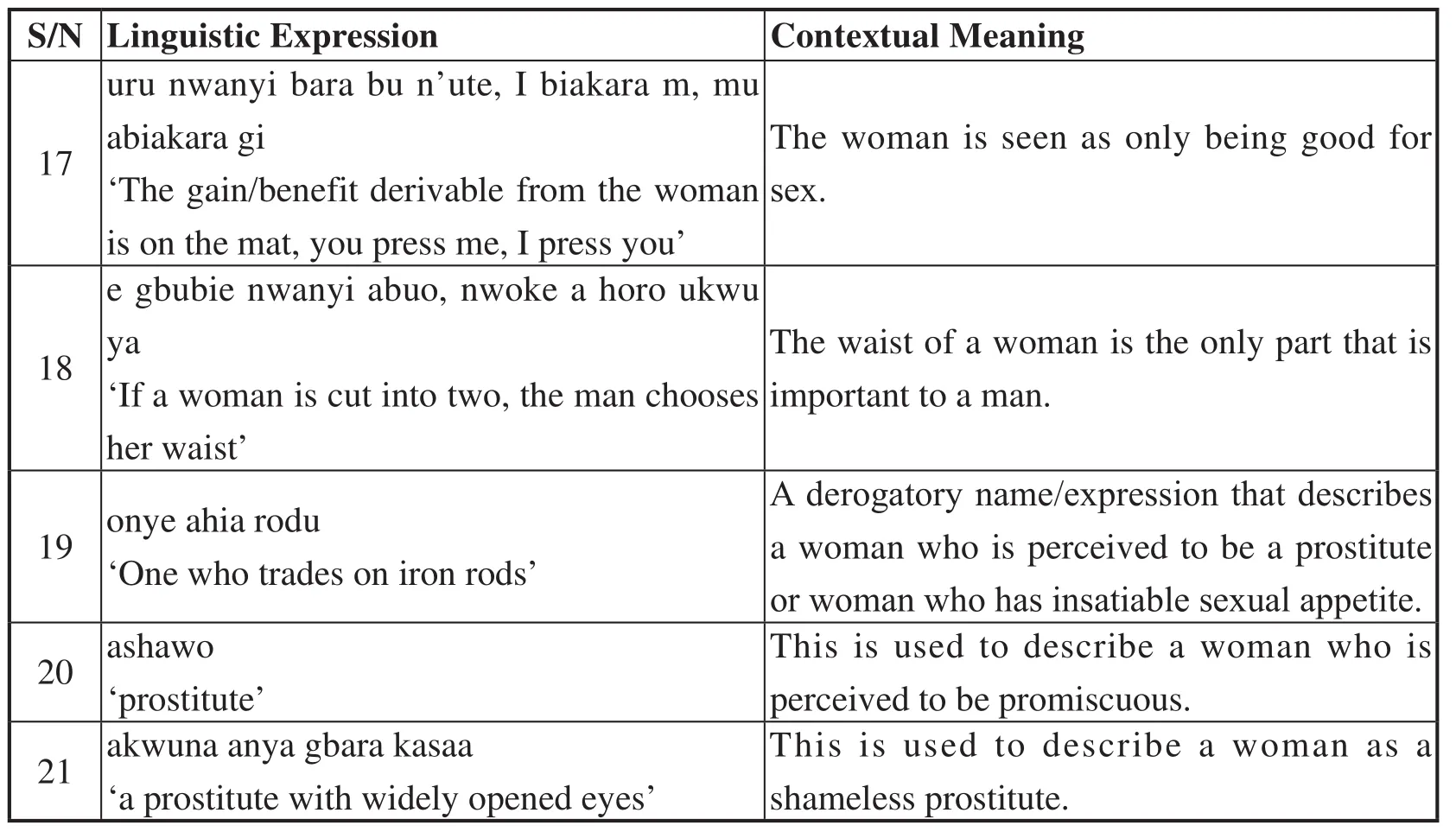
Table 2. Discriminatory expressions that target women as sex objects

Table 3. Discriminatory expressions that generally degrade a woman’s personality/character
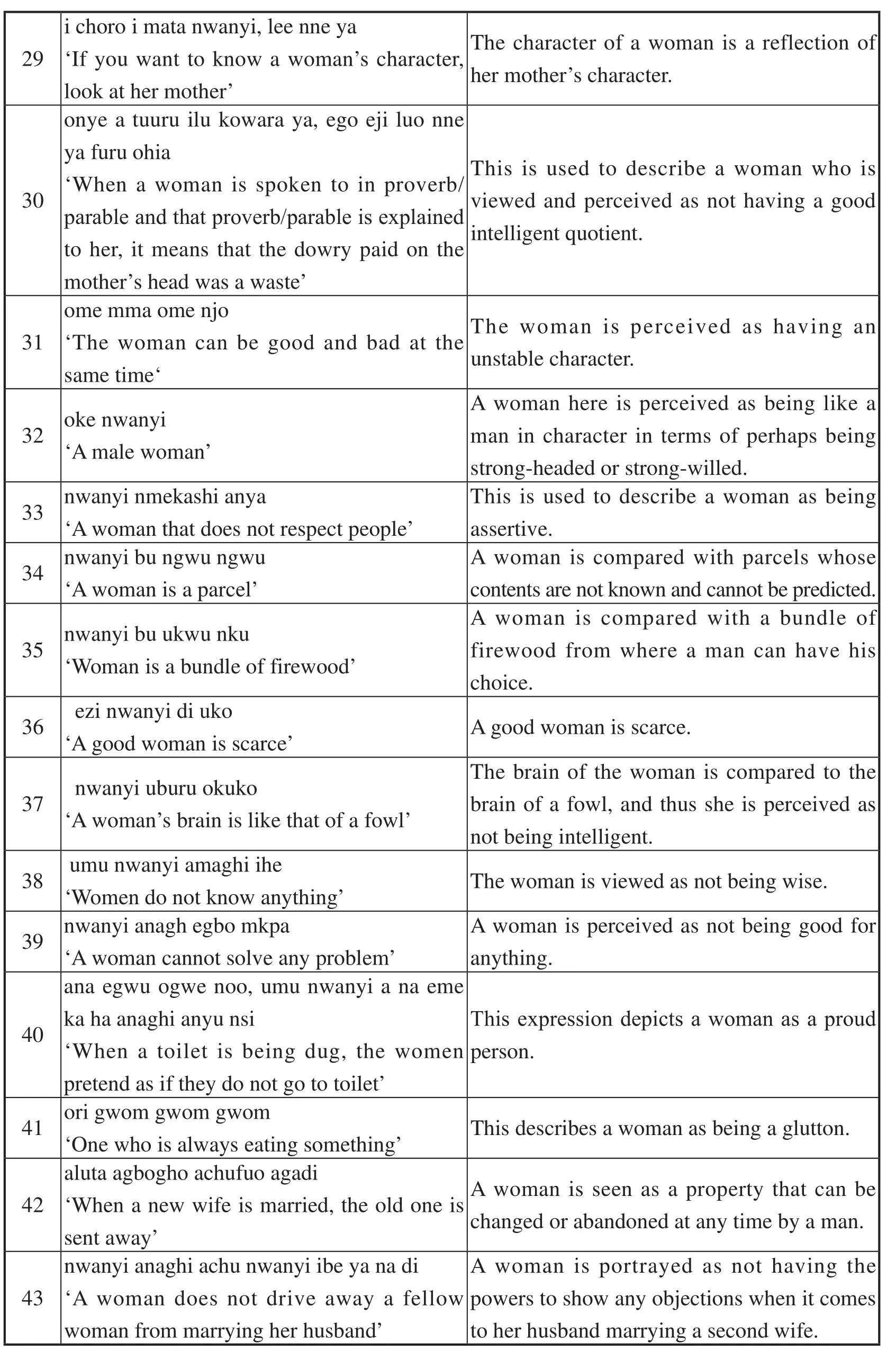
?
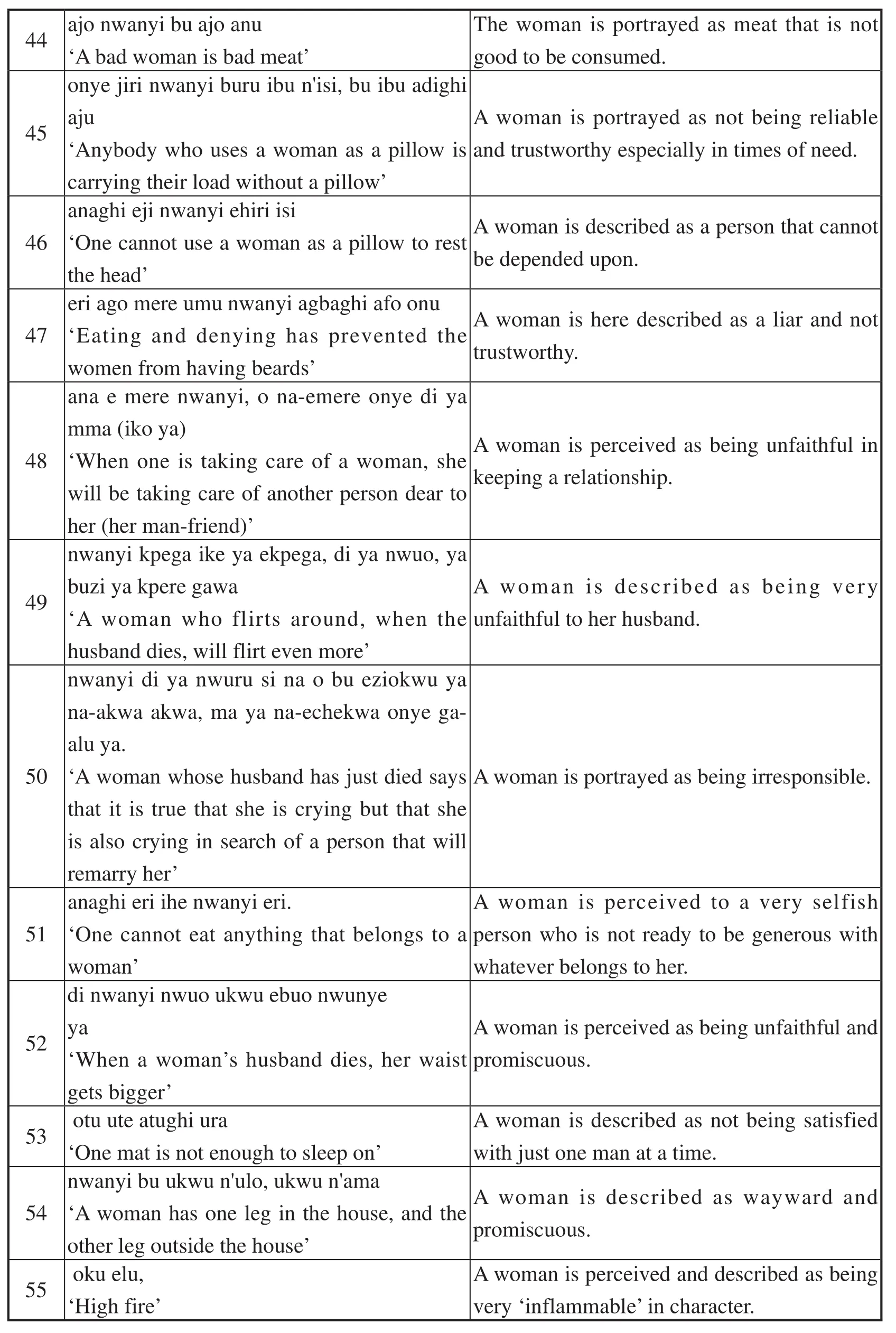
?
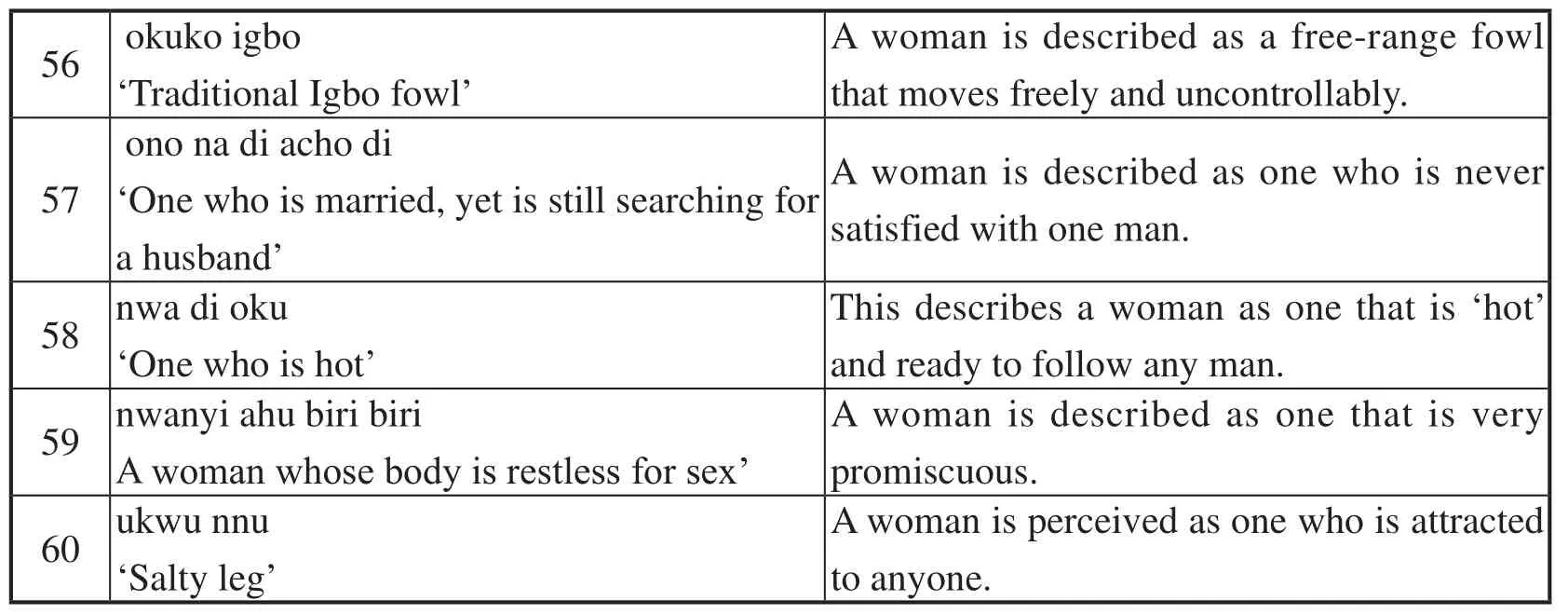
?
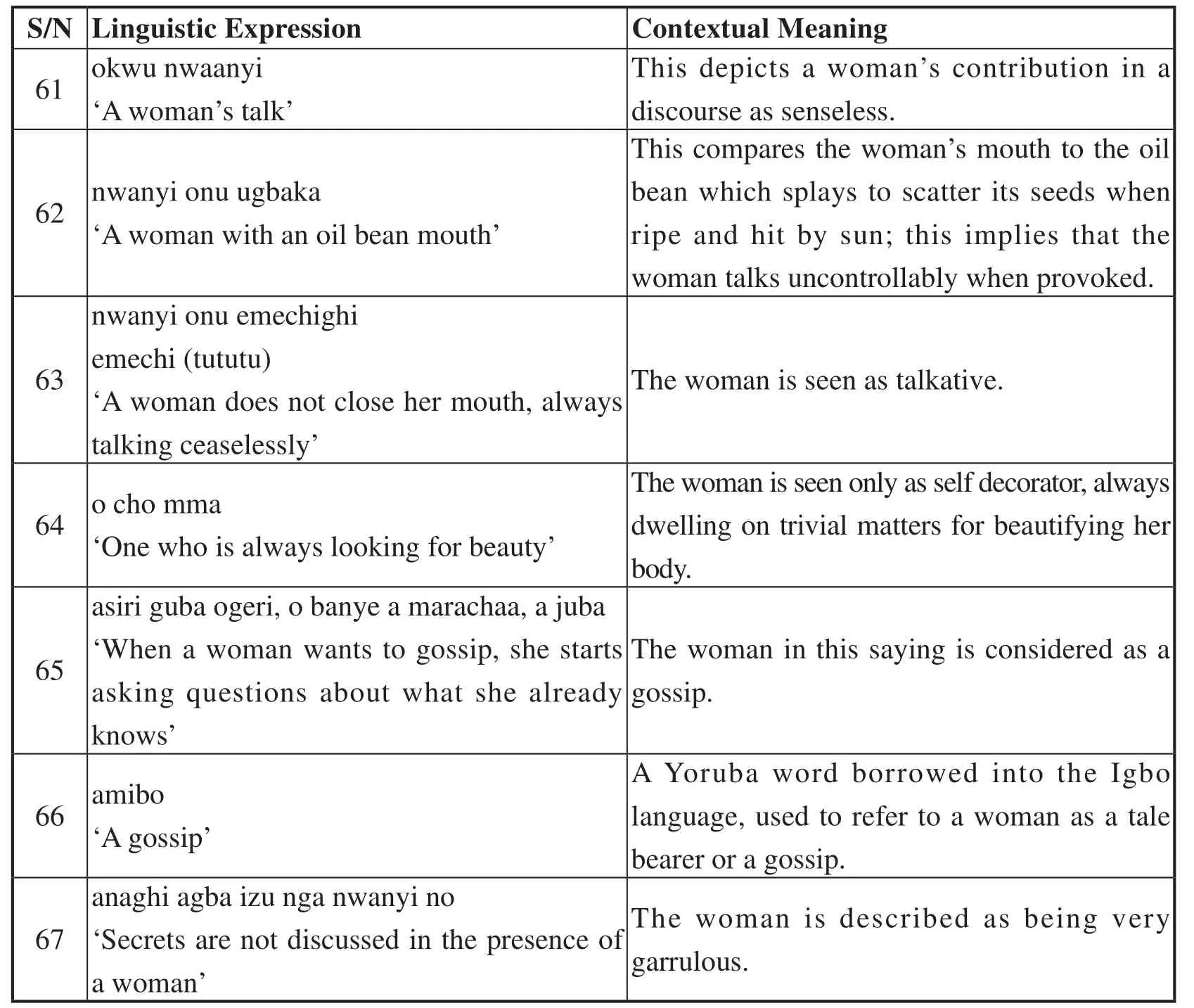
Table 4. Discriminatory expressions that portray women as gossips
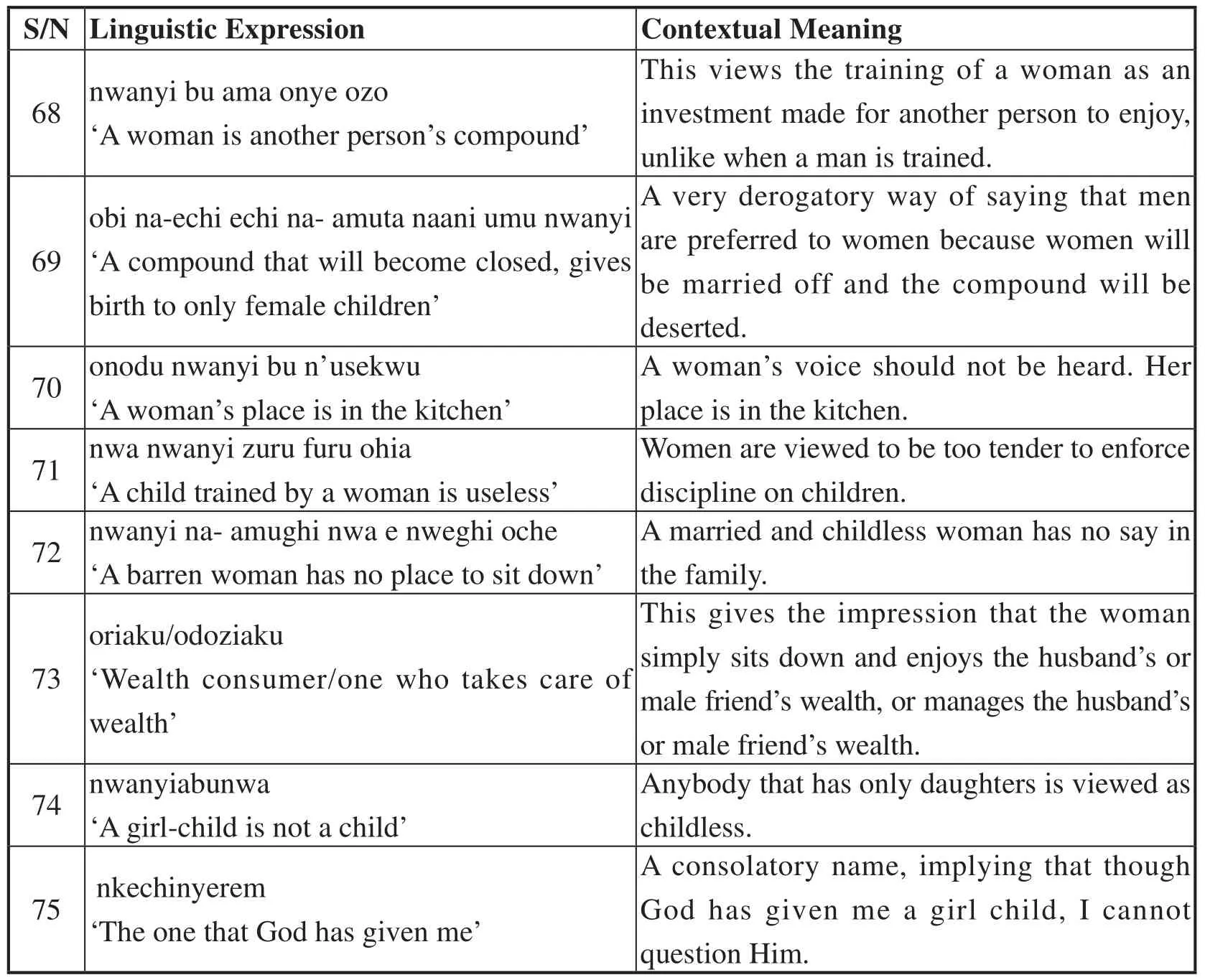
Table 5. Discriminatory linguistic expressions that portray women as being confined or limited to a social space
4. Discussion of Data and Findings
The data as presented in the tables show that there are many discriminatory linguistic expressions that are used to describe a woman in the contemporary Igbo society. Women are compared to all kinds of items such as food, insects, objects and personal property.
In theme 1 (Table 1), the physical appearance of the woman is negatively portrayed.Ihu fantaandukwu coke(in 1 & 2) are used to refer to a woman that is considered to be using skin lightening cream on her face. The face is compared to the colour of Fanta (soda drink) while the legs that remain dark because the bleaching cream is not evenly bleached on them are described like Coca Cola (soda).Ukwu ji(yam legs) andukwu anwuta(mosquito legs) (3 & 4) refer to different sizes of the legs of women. If the legs are viewed to be big, they are compared to a tuber of yam and if the legs are perceived to be slim,they are compared to mosquito legs. In 5-9, the expressions,atinga(the title of a populous Igbo language prose work whereatingais depicted as very slim woman),lekpa(tiny),alika(lizard),alinga okporoko(tiny stock fish), andogwu azu(the bones of fish) are all derogatorily used to describe a woman that is perceived to be very slim. The expressionpinchom, (10) derived from the English wordpinch‘a speck’ is used to describe a woman who is viewed to be small in stature. Data 11 and 12,akpa akpu(a bag of cassava) and orobo (a fat object), are used with a ridiculous tone to describe a woman who is viewed to be fat. Data 13 and 14,ara gbakara agba(breasts that are not firm) andukwu gbakara agba(broken or shapeless waist), are expressions that describe the shape of the breasts and waist of a woman respectively. A broken waist as used in such a description implicates a sense of sexual immorality on the part of the woman being described. In data 15 and 16,nkeirukaandazukaare given Igbo names, but in the instances in which they are used to describe women, their meanings are negatively extended. Whereasnkeiruka(literally translated as ‘the front is bigger’) means ‘the future is bright’, when used as a personal name, it can be used in a discriminatory context against a woman, to refer to breasts that are judged to be very big. Similarly,azuka(which is literally translated to mean ‘the back is bigger’) means the successor(s) will be greater’ when used as a personal name.Azuka,when used in a discriminatory context, characterizes a woman who is viewed as having ‘big buttocks’.
In theme 2 (Table 2), discriminatory expressions that portray women as sex objects are presented. Data 17 and 18 indicate that the woman is only good for satisfying a man’s sexual urge, and if it is possible for her to be literally cut into two while she still remains alive, a man should only be interested in the part that contains her sex organ. The part that contains her head is not necessary to any man since her head is expected to be empty. Data 19-21 paint the picture of a woman as a prostitute. In 19, the man’s private part is seen as an iron rod and the woman is portrayed as having several sexual partners, thus, trading on sexual activities. The concept of harlotry in the life of a woman is sustained by this expression. Women are portrayed as promiscuous. Igbo society does not have names for men who patronize prostitutes or men who are unfaithful to their wives. This amounts to a double standard and thus shows bias against women.
Theme 3 (Table 3) presents expressions that berate a woman’s character. In 22,mgbekeis a name given to a female child born on an‘eke’market day in Igbo land. The name,however, can acquire a negative connotation to refer to a woman that is perceived to be ugly and ‘uncivilized’ in character. In 23, a woman is described as one who has allowed her buttocks to grow out of shape, while in 25, a woman is portrayed as one who becomes proud when she is praised for something worthy she has done. In essence, women should not be commended for any good work done because they will feel proud about it. Data 26-28,oto n’aka nne(one who remains with her mother),nna ga-alu(the one her father will marry), andonye muru, onye na-alu?(who gave birth to [her], who is she married to?) portray a woman as having no societal value without marriage. The expressions paint the picture of a woman as if everything around her is tied to marriage. The implication is that if a woman of marriageable age is not yet married, Igbo society will look at her as if she has no potential. Data 29-30 show that a woman is blamed for any negative trend.When a child is successful, the father is applauded but when a child misbehaves, the mother is blamed. In 31, the expressionomemma,omenjoportrays a woman as having an unstable character. The expression in 32,oke nwanyj(an assertive woman), can be a positive or negative descriptive expression for or against a woman. Thus, when a woman asserts herself and carries her head high, she is negatively regarded asoke nwanyi. On the other hand, when a woman achieves success, she can also be positively described asoke nwanyi. The expression in 33,nwanyi nmekashi anya(a woman that does not respect people), is used to describe a woman who likes to stand for her rights and privileges and therefore is viewed to be disrespectful and not well trained. Data 34 and 35 refer to a woman metaphorically as ‘a parcel’ and ‘a bundle of firewood’ respectively. They both imply that women cannot be predicted like when selecting individual sticks of firewood from a bundle of firewood to use to cook without knowing which one will burn properly,so it is in selecting a woman for marriage; it is a matter of luck for a man to marry a good woman. If it is difficult to know which woman is good for marriage, this gives the impression that women are unpredictable. This is captured in the expression in data 36 which states that ‘a good wife is scarce’.
In data 37-39, a woman is presented as a daft, unintelligent, unwise, and good-fornothing person. In 37, the brain of the woman is compared to the brain of a fowl with the implication that just as the maize seeds are thrown to a fowl and it keeps moving to pick the maize seeds until it is trapped, so do women; they do not reason appropriately.This portrays the woman as a foolish person, as also shown in 38. The expression in 39 describes a woman as being totally financially dependent on the husband and therefore,unable to solve any financial family problem on her own. In 40, a woman is described as being proud, which is captured in the expression which makes the claim that ‘when a toilet is being dug, the woman pretends that she does not use a toilet’.
In 41, the expression,ori gwom gwom gwom(one who eats always; a glutton), portrays a woman as one that cannot control her appetite. In 42, a woman is viewed as property of the man which can be acquired and disposed of anytime. The expression in 43, similar to 42, states that a woman does not drive away a fellow woman from marrying the same husband. This implicates the fact that a woman, as property acquirable by a man, has no right to stop her husband from acquiring more and more properties, thus promoting the culture of polygamy where the man is in charge while the woman is helpless. In 44, a woman is referred to as bad meat, perhaps, a rotten piece of meat that cannot be eaten.
Theme 4 (Table 4) presents discriminatory expressions that portray a woman as talkative and one who dwells on trivialities. Thus, data 61-63 depict a woman as one whose contribution in a discourse is senseless, inferior, and worthless. Data 61-63 also give the impression that a woman does not think before talking. The use oftututuin 63 implies that a woman discusses irrelevant issues. In 64, a woman is described asochomma(one who is always beautifying herself). This description indicates that a woman wastes all her time decorating herself (which means that she dwells on trivial and vain things). In data 65-66,asiri guba ogeri,o banye a maracha a juba(when a woman wants to gossip she starts asking questions about what she already knows) andamibo(a gossip) both present a woman as a tale bearer. In 67, the expressionanaghi agba izu nga nwanyi no(secrets are not discussed in the presence of a woman) clearly indicates that secrets are not discussed in the presence of a woman because she is perceived to be garrulous.
Theme 5 (Table 5) presents proverbs that portray a woman as being limited in social space. In 68, a woman is perceived as belonging to another person’s compound,which means that a woman should get married early enough so as to leave the father’s compound. This accounts for the reason why the female child is sometimes not allowed to acquire formal education, with preference given to a male child to go to school. In 69, the expression implies that ‘a compound that will become extinct gives birth to only female children’. This confirms the expression in 68 that men are preferred to women. In 70, a woman’s place is said to be in the kitchen, which entails that her voice should not be heard. The expression in 71,nwa nwanyi zuru furu ohia(a child trained by a woman is useless) implies that women cannot enforce discipline and therefore cannot be entrusted with the responsibility of raising children.
In 72,nwanyi na-amughi nwa enweghi oche(a barren woman has no place to sit down), shows that a woman that has no children or even has female children only is literally standing in her husband’s house. In the Igbo community, barrenness is seen as a woman’s fault. Again, if a woman gives birth to only female children, she is ridiculed by the society for a situation that is not her making. Some people go to the extent of declaring that a woman that has given birth to only female children is still childless, and such a woman will have no say in the family in which she is married into.
Theme 5 contains discriminatory linguistic expressions that present a woman as an idler. In 73, the expressionoriaku/odoziakugives the impression that a woman simply sits down and enjoys the husband’s wealth or manages the husband’s wealth. It is assumed that she does not contribute to the growth of her family’s resources. In 74,nwanyibunwa(a female child is a child) andnkechinyeremin 75 (the one that God has given me) are both consolatory names implying that since “God has given me a female child, I will accept it”.
4.1 Theoretical analysis of the discriminatory expressions within the speech code theory (SCT)
The discriminatory linguistic expressions employed by Igbo men are a reflection of a distinctive male-dominated culture which also has a reflex of a distinctive speech code as captured by the first proposition of SCT. Men in a typical Igbo society have codified their lives as superior to women and this instinct guides their linguistic description of women in ways that present the women as ‘second-class’ citizens. Even though men and women are part of the same society, and have a symbiotic relationship, the discriminatory expressions used against the women by the men are never used by either men or women to describe men derogatorily.
Within the Igbo society, there are multiple choices within the discriminatory linguistic repertoire of men. They employ multiple and multifarious choices to linguistically berate a woman’s physical appearance, sexual life, character and social shortcomings. The possibility of having the multiple codes illustrates the second proposition of SCT.
The men’s linguistic labels on women is born out of the psychology and pervasive male oriented rhetorics which over time has given the men the feeling that they own the women and should subjugate them culturally, linguistically, economically and politically.This illustrates the third proposition of the SCT which states that ‘a speech code involves a culturally distinctive psychology, sociology, and rhetoric’.
数字PCR打破传统的食品检测技术,不受扩增效率约束、无需使用内参基因与标准曲线,检测准确度高,并且具有较强的灵敏性、耐受性和绝对定量的优势。现如今,数字PCR技术已经得到了广泛应用,未来发展前景非常广阔。
The cultural significance of the different shades of meaning associated with the derogatory linguistic expressions used against women largely depends on the belief system in contemporary Igbo society. Igbo society abhors sexual promiscuity, laziness, gossiping and immobility in socio-cultural space and these are easily attributable to women whose economic powers do match those of the men. This kind of situation vividly captures the fourth proposition of SCT, which states that ‘the significance of speaking depends on the speech codes used by speakers and listeners to create and interpret their communication’.
The discriminatory linguistic expressions as used by the men have specific social locations where they are generally applicable and used. Some of the expressions are targeted towards a woman’s inherent biological gender, physical outlook, behavioural patterns, linguistic behaviour, economic strength/productivity, and even occupational roles. Thus, the discriminatory expressions are located in social discourses revolving around a woman’s life in totality, a situation which vividly captures the fifth proposition of SCT which states that ‘the terms, premises, and rules of a speech code are inextricably woven into speech itself’.
The discriminatory linguistic expressions have direct discursive force on the women at whom they are directed. They inherently and potentially inhibit and limit the women’s socio-economic mobility in contemporary Igbo society. They are reflective of the way men in Igbo society control, predict, and explain the womanhood.
5. Conclusion
The discriminatory expressions reflect men’s perspectives towards women. The use and pervasiveness of the discriminatory expressions against women is strong evidence of a deep-rooted and gender-biased ideology in contemporary Igbo society. From the data presented and analyzed in the various tables (1-5) above, a woman in contemporary Igbo society is compared to food, insects, animals, and household objects. She is viewed as property that can be owned, used by the man, and thrown away at any time. The discriminatory linguistic expressions show that a woman has little value, little respect, and little voice, and this is reflected from the language used in addressing her. Female gender bias as reflected in the Igbo language is deeply rooted in the patriarchal nature of the Igbo society. The men are in charge of all central activities, and consequently,women are looked down upon. They are seen as sex objects, unfaithful, unreliable, insensitive, talkative, unintelligent, limited in social space, and idle, and as such seen as spending most of their time on trivial, unimportant issues. The implication of using such expressions and proverbs against women in the Igbo society is that many Igbo women over time lose self-confidence and live in fear of going beyond what the society thinks is acceptable female behaviour (cf. Meyer, 2010). This situation does not contribute to the overall development of the society. These discriminatory expressions point to a pervasive and persistent oppression and subordination of women. It is recommended that socialization of the children, especially the male ones, from the home and throughout their formative stages should deemphasize linguistic rhetorics that portrays girls and women generally as inferior to men. This paper concludes that there is need for more studies on the attitudes towards women and how such attitudes affect women’s personality, and as well how they are reflected in language use.
Acholonu, C. (2011).Igbo language: A former global lingual franca and the mother of semantic languages. Paper presented at the Igbo Studies Association Conference, held at the Howard University, USA, 8-9 April. Retrieved from www.cercafriculture.org
Adegbite, W. (2009). Language, gender and politics: A general perspective. In A. Odebunmi, A. E.Arua, & S. Arimi (Eds.),Language, gender and politics: A Festschrift for Yisa Kehinde Yusuf(pp.12-26). Lagos: Concept.
Afigbo, A. E. (1981).Ropes of sand. Ibadan: Caxton Press.
Chandler, D. (1994). The Sapir-Whorf Hypothesis. Retrieved from www.blutner.de/color/sapirwhorf
Emenyi, I. A. (2005).Intersection of gendered voices. Lagos: Concept.
Han, H. (n.d.). Gender discrimination in the Korean language. Retrieved from http/:www.gender.gp journal
Holmes, J. (2013).An introduction to sociolinguistics. London: Routledge.
Hudson, R. A. (1996).Sociolinguistics. Cambridge: Cambridge University Press.
Mbarachi, C. S. (2010).Language and gender bias: A study of sexism in English and Igbo(Unpublished master’s thesis). University of Uyo.
Meyer, J. (2010).The confident woman. New York: Faith Words.
Modo, I. V. O. (2004). Language in society and culture. In I. V. O. Modo (Ed.),Issues in anthropology(pp. 199-201). Uyo: Dorand.
Oke, N. (2015).Language and gender: A sociolinguistic presentation of Igbo gender proverbs.Umuahia: Chuzzy.
Ozumba, G. (2005). Gender-sensitivity in Igbo culture: A philosophical re-appraisal.Quodlibet Journal,7(2). Retrieved from http://www.quodlibet.net/articles/ozumba-gender.shtml
Philipsen, G. (1987). The prospect for cultural communication. In L. Kinkaid (Ed.),Communication theory: Eastern and Western perspectives(pp. 245-254). New York, NY:Academic Press.
Philipsen, G. (1992).Speaking culturally: Explorations in social communication. Albany, NY:State University of New York Press.
Philipsen, G. (1997). A theory of speech codes. In G. Philipsen & T. Albrecht (Eds.),Developing communication theory(pp. 119-156). Albany, NY: State University of New York Press.
Philipsen, G. (2003). Cultural communication. In W. B. Gudykunst (Ed.),Cross-cultural and intercultural communication(pp. 35-51). Thousand Oaks, CA: Sage Publications.
Philipsen, G., Coutu, L., & Covarrubias, P. (2005). Speech codes theory: Restatement, revisions,and responses to criticisms. In W. B. Gudykunst (Ed.),Theorizing about intercultural communication(pp. 55-68). Thousand Oaks, CA: Sage Publications.
Wardhaugh, R. (2006).An introduction to sociolinguistics. Oxford: Blackwell.
Wood, J. (2007).Communication, gender and culture. US: Thomas Wardsworth.
Yusuf, Y. K. (1998). Gender bias and images of women in English and Yoruba proverbs: A crosscultural approach. In M. E. Kolawale (Ed.),Gender perceptions and development in Africa(pp.48-63). Lagos: Arrabon Academic.
(Copy editing: Curtis Harrison)
About the authors
Ogbonna Anyanwu, PhD (ogbonnaanyanwu@yahoo.com) is a senior lecturer in the Department of Linguistics and Nigerian Languages, University of Uyo, Nigeria.
Ngozi Ugo-Ochulo (ngoochulo@yahoo.com) is a lecturer in the Department of General Studies, Michael Okpara University of Agriculture, Umudike, Nigeria.
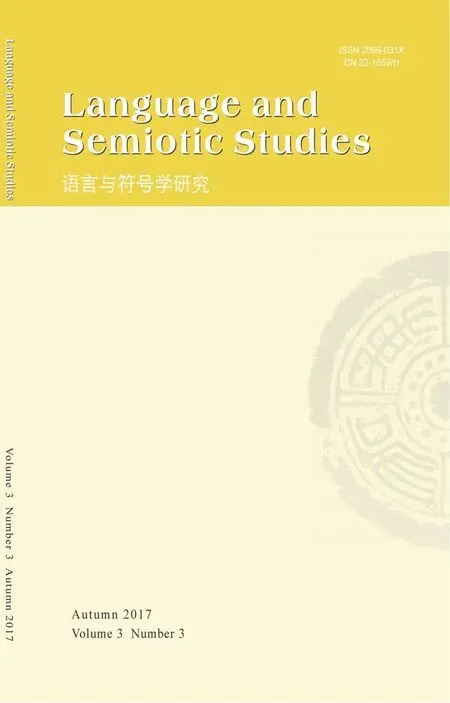 Language and Semiotic Studies2017年3期
Language and Semiotic Studies2017年3期
- Language and Semiotic Studies的其它文章
- Wilhelm II’s ‘Hun Speech’ and Its Alleged Resemiotization During World War I
- The Meaning and Madness of Money: A Semio-Ecological Analysis
- Facebook Engagement and Its Relation to Visuals,With a Focus on Brand Culture
- A Socio-Semiotic Perspective on Boko Haram Terrorism in Northern Nigeria
- Stasis Salience and the Enthymemic Thesis1
- A Century in Retrospect: Several Theoretical Problems of Russian Formalism From a Paradigm Perspective
